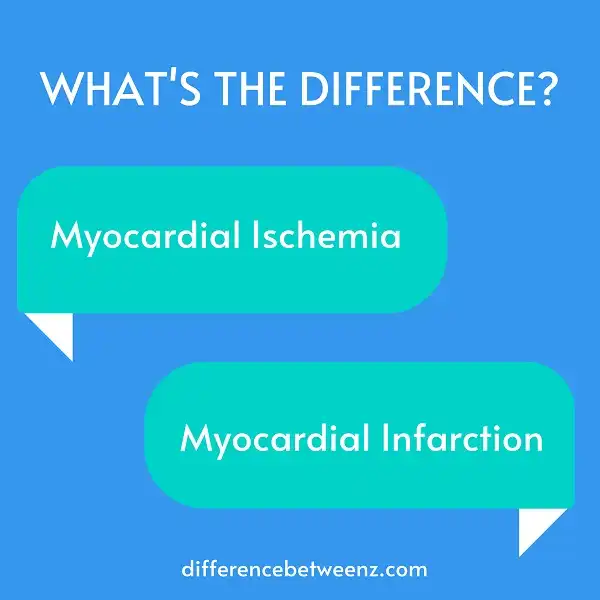There are several important differences between myocardial ischemia and myocardial infarction. Myocardial ischemia is a condition in which the heart muscle does not receive enough oxygen-rich blood. This can cause chest pain, shortness of breath, and other symptoms. Myocardial infarction, or heart attack, occurs when the coronary arteries become blocked and the heart muscle is damaged. Symptoms of a heart attack include chest pain, shortness of breath, sweating, nausea, and vomiting. It is important to know the difference between these two conditions, as they require different treatments.
What is Myocardial Ischemia?
Myocardial ischemia is a condition in which the blood flow to the heart muscle is decreased. This decrease in blood flow can cause the heart to not function properly. Myocardial ischemia can be caused by a number of things, including a blockage in the arteries that supply blood to the heart, a heart attack, or an injury to the heart. Myocardial ischemia can also be caused by a combination of these factors. Treatment for myocardial ischemia depends on the underlying cause of the condition. Myocardial ischemia can be a very serious condition, so it is important to seek medical help if you think you may have this condition.
What is Myocardial Infarction?
Myocardial Infarction, more commonly known as a heart attack, occurs when the blood flow to the heart muscle is blocked. This can happen due to a buildup of plaque in the arteries, or if a blood clot forms. Without enough blood, the heart muscle can become damaged or even die. Heart attacks can cause intense chest pain, shortness of breath, and even death. If you think you or someone else may be having a heart attack, it is important to call 9-1-1 immediately. With prompt treatment, many people who have Myocardial Infarctions go on to live healthy lives.
Differences between Myocardial Ischemia and Myocardial Infarction
Myocardial ischemia and myocardial infarction are two terms that are often used interchangeably, but there are subtle differences between the two conditions. Myocardial ischemia refers to a decrease in blood flow to the heart muscle, often due to the narrowing of the coronary arteries. Myocardial infarction, on the other hand, occurs when there is a complete blockage of blood flow to the heart muscle. This can lead to tissue death and permanent damage to the heart. Myocardial ischemia is a serious condition that can lead to myocardial infarction, so it is important to be aware of the difference between the two. If you think you may be experiencing symptoms of myocardial ischemia, it is important to seek medical attention immediately. With early diagnosis and treatment, the chances of developing myocardial infarction can be greatly reduced.
Conclusion
Although the terms myocardial ischemia and myocardial infarction are often used interchangeably, they are actually two different conditions. Myocardial ischemia is a condition in which blood flow to the heart muscle is reduced, while myocardial infarction (or heart attack) occurs when that reduced blood flow results in damage to the heart muscle. Knowing the difference between these two conditions can be important for making decisions about treatment options. If you think you or someone you know may be experiencing symptoms of either myocardial ischemia or myocardial infarction, it’s important to seek medical attention right away.


